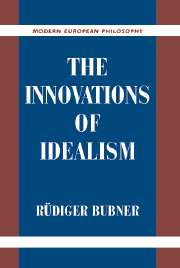6 - Hegel's Concept of Phenomenology
from HISTORY
Published online by Cambridge University Press: 06 August 2009
Summary
Preliminary Remarks
In order to shed light on the origins of Hegel's concept of phenomenology, I will begin by considering some of his first essays.
The irretrievable loss of the ancient Greek's sense of freedom and political unity must have had the most profound meaning for Hegel and his Tübingen friends Schelling and Hölderlin. The fragmented age in which they lived seemed far removed from that all-encompassing spirit which had animated the “genius of nations” “from the days of the past.” The “power of unification” they demanded from life had “disappeared from the lives of men” altogether, as Hegel was to lament in one of his early notes. This insight into the modern world's inherent lack of unity is the axis around which much of his early thinking turns.
The leitmotif of Hegel's juvenile writings is religion, and his first, main concern is to rethink religion against the backdrop of Kant's moral philosophy. For the young Hegel, religion revealed a state of “positivity,” of unquestioning submission to authority and blind adherence to doctrine. According to this understanding, positive religion stands diametrically opposed to religion rooted in practical reason's concept of morality. The limits of an ideal of religion based on morality become blatant, however, when theology, in its turn, appropriates Kant's concept of practical reason, together with his doctrine of postulates, to reinforce its authority and produces a particularly intractable form of orthodoxy.
- Type
- Chapter
- Information
- The Innovations of Idealism , pp. 119 - 144Publisher: Cambridge University PressPrint publication year: 2003
- 1
- Cited by



